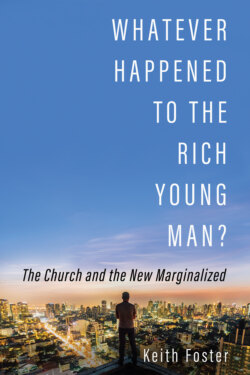Читать книгу Whatever Happened to the Rich Young Man? - Keith Foster - Страница 6
На сайте Литреса книга снята с продажи.
Introduction
ОглавлениеThe idea for this book came out of my doctoral studies at Roehampton University, London. For a long time, I had been frustrated by (what I saw) as the church’s focus on the needy within the local community, with its resources and programs often being dominated by this demographic. As someone who had both volunteered and served in a paid role for the church in (what was defined as) a “deprived area,” I appreciated the importance of such a “service of mercy.” Additionally, as an evangelical Christian, I had a clear biblical understanding of God’s heart for the poor, the widow, the vulnerable; but what about those who were “well off” or just “doing okay”? What about those who did not have any obvious needs, yet all the same needed Christ, needed to know the life-saving message of the life, death, resurrection, and return of King Jesus? The church I was serving in (at the time) had no “program” for them.
My own experience working in industry, both corporate and military, for twenty-five years, the last ten in senior management, had also reaffirmed the problem. Outside of inviting people to church, by and large the church had no intentional strategy to reach what I call the New Marginalized, those without obvious economic needs. As I worked in various roles in various companies (e.g., operations manager, project manager, company owner), I felt a disconnect between the high-flying corporate world with its company cars, hospitality, and multi-million-pound projects, and my low-budget, occasionally dysfunctional church. How on earth could the church (not just the one I attended, but the many who struggled to connect with the corporate world) even begin to relevantly reach out to the New Marginalized?
This sense of disconnect was only confirmed when I took up the senior pastorate of Bethel Church in Coventry in 2009. The church was one of eighty-eight churches planted between 1928 and 1937, and the last church to be planted out of the Bethel evangelical tent campaign.1 The church was located between two very different and contrasting areas, one considered deprived and the other affluent and somewhat metropolitan. The church had a busy and efficient program, all run by enthusiastic volunteers, yet by and large with a focus on the welfare demographic. The conversations around any outreach were largely directed at “those over in the flats” and those with drug and alcohol addictions—the obvious needy. Several members in professional roles had expressed frustration at this strategy: What about their friends and work colleagues? What could be done to reach them? Ministry in the workplace was rarely spoken of in the main, even ignored. Within my first year, I delivered a short series of studies on ministry in the workplace using some helpful materials produced by the London Institute of Contemporary Christianity (LICC). However, this was a token offering. The general focus and outreach culture of the church was geared toward the welfare demographic, the measured marginalized. Something needed to be done. The more people I spoke to, the more common I found this problem to be: Professional people in churches who were happy to serve and tithe for the Kingdom somehow felt a disconnect between the church and their corporate lives. Thus, this book.
This Book
Whatever Happened to the Rich Young Man? has been born out of this frustration. Yet this is not simply a book that laments the (already) well-rehearsed issue of a disconnect with the New Marginalized, the non-welfare demographic; but one that is written to encourage church leaders and everyday members to make those connections. As a mix of theology, personal anecdote, and practical case studies (ones I have had the pleasure to be involved with), this book seeks to encourage the church to “broaden its nets,” to be inspired to think beyond its stereotyped role as a neoliberal welfare provider, and to recognize that we are all spiritually needy. As the “hope of the world,” the church is best placed to reach (what Jesus referred to as) the “impossible” (Luke 18:18–30).
Keith Foster
May 2020
1. Watts, Edward Jefferies.
